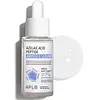What's inside
What's inside
 Key Ingredients
Key Ingredients

 Benefits
Benefits

 Concerns
Concerns

No concerns
 Ingredients Side-by-side
Ingredients Side-by-side

Water
Skin ConditioningCentella Asiatica Leaf Water
Skin ConditioningButylene Glycol
HumectantPropanediol
SolventGlycerin
HumectantDiethoxyethyl Succinate
SolventAzelaic Acid
BufferingSh-Oligopeptide-1
Skin ConditioningMadecassic Acid
Skin ConditioningAsiaticoside
AntioxidantAsiatic Acid
Skin ConditioningSqualane
EmollientSolanum Melongena Fruit Extract
Skin ConditioningMelaleuca Alternifolia Leaf Extract
PerfumingBeta-Glucan
Skin ConditioningHippophae Rhamnoides Fruit Extract
Skin ConditioningNelumbo Nucifera Extract
Skin ConditioningArtemisia Annua Extract
MaskingOryza Sativa Extract
AbsorbentSaccharomyces Ferment
Skin ConditioningDipropylene Glycol
HumectantSodium Citrate
BufferingSodium Hyaluronate
HumectantAllantoin
Skin ConditioningCellulose Gum
Emulsion StabilisingDisodium EDTA
Glyceryl Acrylate/Acrylic Acid Copolymer
HumectantCitric Acid
BufferingXanthan Gum
EmulsifyingInulin
Skin ConditioningCellulose
AbsorbentGlucose
HumectantFructose
HumectantPanthenol
Skin ConditioningEthylhexylglycerin
Skin ConditioningHydroxyacetophenone
AntioxidantSodium Polyacryloyldimethyl Taurate
Emulsion StabilisingDipotassium Glycyrrhizate
Humectant1,2-Hexanediol
Skin ConditioningWater, Centella Asiatica Leaf Water, Butylene Glycol, Propanediol, Glycerin, Diethoxyethyl Succinate, Azelaic Acid, Sh-Oligopeptide-1, Madecassic Acid, Asiaticoside, Asiatic Acid, Squalane, Solanum Melongena Fruit Extract, Melaleuca Alternifolia Leaf Extract, Beta-Glucan, Hippophae Rhamnoides Fruit Extract, Nelumbo Nucifera Extract, Artemisia Annua Extract, Oryza Sativa Extract, Saccharomyces Ferment, Dipropylene Glycol, Sodium Citrate, Sodium Hyaluronate, Allantoin, Cellulose Gum, Disodium EDTA, Glyceryl Acrylate/Acrylic Acid Copolymer, Citric Acid, Xanthan Gum, Inulin, Cellulose, Glucose, Fructose, Panthenol, Ethylhexylglycerin, Hydroxyacetophenone, Sodium Polyacryloyldimethyl Taurate, Dipotassium Glycyrrhizate, 1,2-Hexanediol
 Reviews
Reviews

Ingredients Explained
These ingredients are found in both products.
Ingredients higher up in an ingredient list are typically present in a larger amount.
1,2-Hexanediol is a synthetic liquid and another multi-functional powerhouse.
It is a:
- Humectant, drawing moisture into the skin
- Emollient, helping to soften skin
- Solvent, dispersing and stabilizing formulas
- Preservative booster, enhancing the antimicrobial activity of other preservatives
Azelaic acid is a multitasker ingredient that helps treat acne, pigmentation, and irritation. It is a great option for sensitive skin.
What makes azelaic special?
The best thing about azelaic acid is it's gentleness. It's generally well-tolerated and safe to use alongside other actives like niacinamide or salicylic acid.
Unlike AHAs, azelaic acid will not make you photosensitive/sun sensitive.
You can find this ingredient naturally occurring in grains like wheat, rye, and barley. In cosmetics, azelaic acid is typically lab-made, which is more stable and effective.
Learn more about Azelaic AcidPanthenol is a common ingredient that helps hydrate and soothe the skin. It is found naturally in our skin and hair.
There are two forms of panthenol: D and L.
D-panthenol is also known as dexpanthenol. Most cosmetics use dexpanthenol or a mixture of D and L-panthenol.
Panthenol is famous due to its ability to go deeper into the skin's layers. Using this ingredient has numerous pros (and no cons):
Like hyaluronic acid, panthenol is a humectant. Humectants are able to bind and hold large amounts of water to keep skin hydrated.
This ingredient works well for wound healing. It works by increasing tissue in the wound and helps close open wounds.
Once oxidized, panthenol converts to pantothenic acid. Panthothenic acid is found in all living cells.
This ingredient is also referred to as pro-vitamin B5.
Learn more about PanthenolPropanediol is an all-star ingredient. It softens, hydrates, and smooths the skin.
It’s often used to:
Propanediol is not likely to cause sensitivity and considered safe to use. It is derived from corn or petroleum with a clear color and no scent.
Learn more about PropanediolSodium Hyaluronate is hyaluronic acid's salt form. It is commonly derived from the sodium salt of hyaluronic acid.
Like hyaluronic acid, it is great at holding water and acts as a humectant. This makes it a great skin hydrating ingredient.
Sodium Hyaluronate is naturally occurring in our bodies and is mostly found in eye fluid and joints.
These are some other common types of Hyaluronic Acid:
Learn more about Sodium Hyaluronate